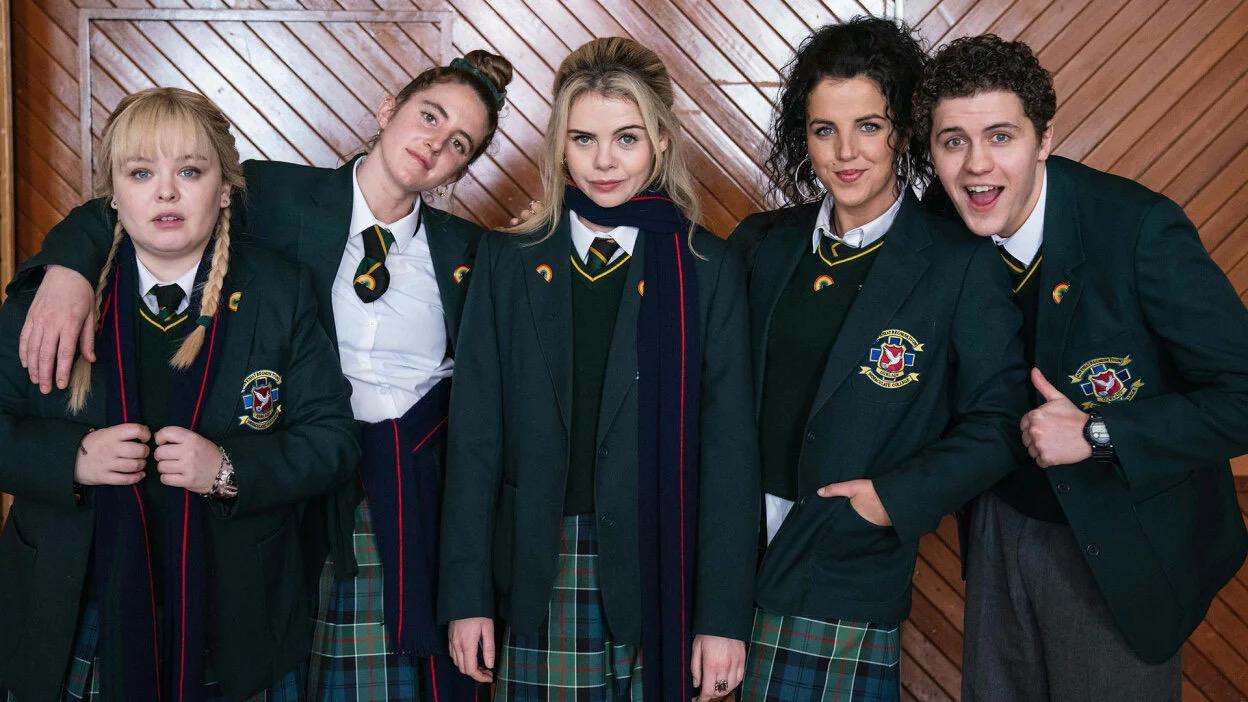Why ‘Derry Girls’ has become an international cult hit
Nicola Coughlan, Louis Clare Harland, Saoirse Monica Jackson, Jamie-Lee O’Donnell and Dylan Llewellyn, the stars of “Derry Girls,” are shown from left to right.
Seaneen Molloy had become accustomed to rolling her eyes at the overdramatic portrayals of her home of Northern Ireland.
“Nothing’s ever portrayed us as actual real people,” Molloy said. “We’re either portrayed as the sort of blighted victims of a terrible war or just idiots that are fighting over nothing.”
Related: Oscar-nominated ‘Wolfwalkers’ blends environmental, spiritual history of Ireland
That changed with the hit comedy, “Derry Girls,” which premiered in 2018 and aired its final episode in the UK this week. The show strikes a chord especially with women like Molloy who grew up in Northern Ireland in the 1990s, a period of conflict between Catholics and Protestants known as the “troubles.”
“My first reaction was [that] the accents didn’t make me want to throw the TV out the window.”
“My first reaction was [that] the accents didn’t make me want to throw the TV out the window,” Molloy said.
She kept watching for the humor — and stayed for the relatability: “It just makes me feel like someone has sort of ripped into my life.”
“Derry Girls” doesn’t ignore the daily realities of bomb threats and machine guns from that era. But the show is told from the perspective of five teens whose biggest priorities are boys, dreams and getting into all kinds of mischief.
Related: The woman who shot Benito Mussolini was forgotten for decades. Ireland wants to change that.
There’s Erin, the angsty ambitious one; Orla, her flaky cousin; high-strung, studious Clare (played by Nicola Coughlan of the hit Netflix show, “Bridgerton”); James, aka the wee English fella who becomes the butt of all jokes; and Michelle, the brash one with a filthy mouth.
“Everyone went to school with a ‘Michelle’ in Ireland,” said Tanya Sweeney, a columnist and features writer for the Irish Independent.
Sweeney applauds the show’s creator Lisa McGee for her sharp writing, attention to detail, and above all, her ability to tell a story that resonates.
“McGee certainly does not want to minimize the impact of the ‘troubles’ on Northern Irish society. But at the same time, she’s doing that thing where she is actually providing a very authentic account because teenagers just didn’t care,” she said.
“I have friends who went into Belfast on Saturday mornings — their bags were checked by soldiers but they didn’t care because they had to get into town to buy the top that they wanted for that night.”
“I have friends who went into Belfast on Saturday mornings — their bags were checked by soldiers but they didn’t care because they had to get into town to buy the top that they wanted for that night.”
Some say that they were surprised to see the show resonate abroad because many of the jokes and jargon require local knowledge to fully understand.
But that’s part of McGee’s genius, Sweeney said: “This is a show for [people from Northern Ireland], and everyone else who can enjoy it can just crane their necks a little harder to understand what we’re saying, and they can just look in a little, you know, a little harder.”
Take an episode from season two when Catholic and Protestant students meet for a special “Friends Across The Barricade” trip and are asked to name their similarities and differences, which are then jotted down on a blackboard.
They can only come up with differences, including stereotypes and expressions such as: Protestants hate Abba; Catholics have more freckles; Protestants love gardening; and Catholics love JFK.
“It was just so well-observed,” said Sarah Dorman, who lives in London but is originally from a suburb just outside Belfast.
Her favorite: Protestants keep their toasters in the cupboard.
“That is very Northern Irish, and it is true; people do say that, and I’m from a Protestant community and my mum does keep her toaster in the cupboard.”
The scene has become so famous that the blackboard itself is now on display at the Ulster Museum as part of an exhibit on stereotypes.
The show’s two-part series finale, an hourlong special that takes place around the 1998 Good Friday Agreement referendum has it all — a string of A-list cameos, 1990s nostalgia and the slapstick silliness that has kept fans coming back.
But critics also praise the penultimate episode for its emotional maturity, striking a perfect balance between humor and the depth of the vote in front of them.
For many in the UK, the show has also been a history lesson — for better or for worse.
Siobhán McSweeney, who plays the not-so-pious nun and school headmistress, Sister Michael, said that she was “deeply shocked” to receive messages from fans who told her that the show has taught them more about Northern Ireland history than anything they learned in school.
McSweeney told BBC 4’s Today show: “I think if you put aside the absolute disgrace it is that there’s such a gap in the educational system here that they have to look to a comedy to find out about Northern Irish politics that still have an effect, I think it shows how good the medium of comedy can be to spread a message.”
Our coverage reaches millions each week, but only a small fraction of listeners contribute to sustain our program. We still need 224 more people to donate $100 or $10/monthly to unlock our $67,000 match. Will you help us get there today?
